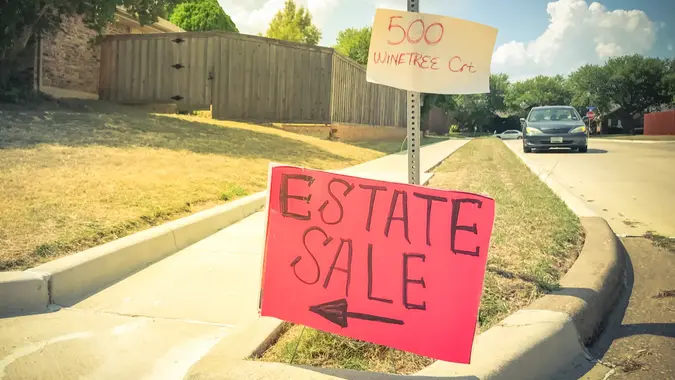The Essential Guide to a Successful Estate Sale

Commitment to Our Readers
GOBankingRates' editorial team is committed to bringing you unbiased reviews and information. We use data-driven methodologies to evaluate financial products and services - our reviews and ratings are not influenced by advertisers. You can read more about our editorial guidelines and our products and services review methodology.

20 Years
Helping You Live Richer

Reviewed
by Experts

Trusted by
Millions of Readers
When a loved one dies, or you or a family member must downsize, an estate sale helps pare down belongings. Some people hire an estate sale company to do the sale, but fees run 30% to 40% of proceeds, according to Realtor.com.
You can save money by managing the sale yourself. This guide tells you how.
What Is an Estate Sale?
An estate sale liquidates most or all of a person’s belongings. Often held after someone has died, an estate sale can also help you or a loved one downsize into a smaller home or long-term care.
Who Plans the Estate Sale?
Anyone can hold a downsizing sale. With an estate sale, the executor or personal representative is responsible for safeguarding assets, determining their value and ultimately disposing of them, per the American Bar Association. But they can delegate the sale to someone else.
How Do You Prepare for an Estate Sale?
You can begin planning as soon as you have the authority to hold the estate sale.
Organize the Belongings
Sort all the belongings into “dispose,” “donate,” and “sell” categories. Remove “dispose” and “donate” items, then organize the sale items to make it easier to value and display them. Keep an inventory to document the sale for the estate.
Price the Estate Sale Items
Consider hiring an appraiser if the estate has many valuable items. Otherwise, research values using local online marketplace listings and collectible guides, and auction sites like eBay.
Price items to encourage quick sales at or near value. Running the sale over multiple days gives you the flexibility to lower prices on items that haven’t sold.
Schedule and Promote the Estate Sale
Schedule the sale a couple of weeks out to allow time for promotion.
Advertise on online marketplaces and local social media groups. Estate-sale websites such as EstateSales.net might be useful in highly populated areas. Include photos and descriptions of high-demand items.
On sale day, put directional signs around your neighborhood.
Decide How To Dispose of Items That Don’t Sell
You can dispose of unsold items by donating them to a charity or turning them over to an auction house. Schedule pickup or delivery as soon as you know your sale dates.
Set Up the Sale
Wash the items before pricing and arranging them on tables. If the home is going to be sold, display items throughout so shoppers can also preview the property.
Get Ready for Sale Day
The day before, place your signs, and get plenty of cash for making change. If helpers are available, set up multiple payment stations for faster checkout.
What To Do on Sale Day
All that should be left to do on sale day is open the house, assist customers and track sales.
Consolidate items into fewer rooms at the end of the first day to simplify the final cleanout.
What To Do After the Estate Sale
If the sale involves an estate, the proceeds likely must go into the estate account. If you aren’t authorized to make deposits, give an inventory list and proceeds to the executor.
 Written by
Written by  Edited by
Edited by 

























